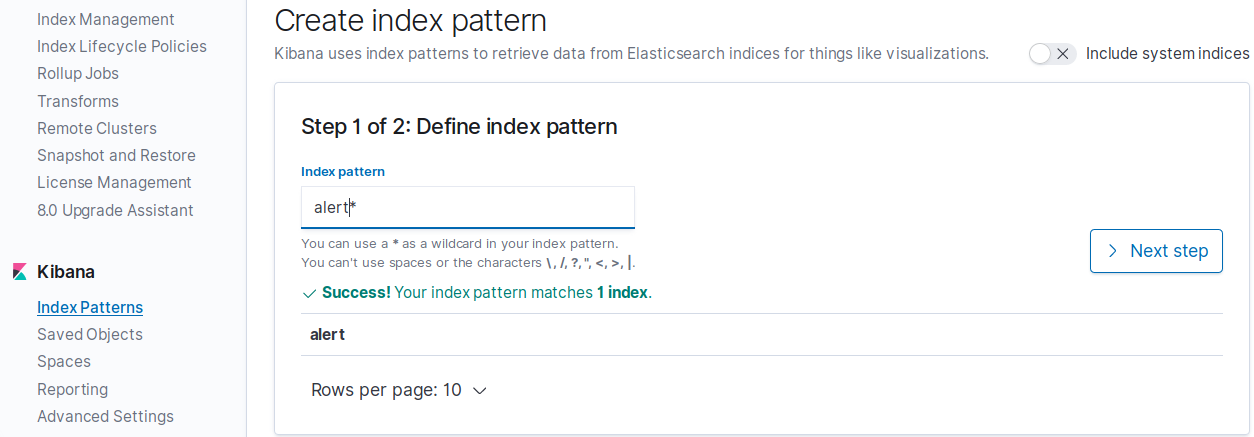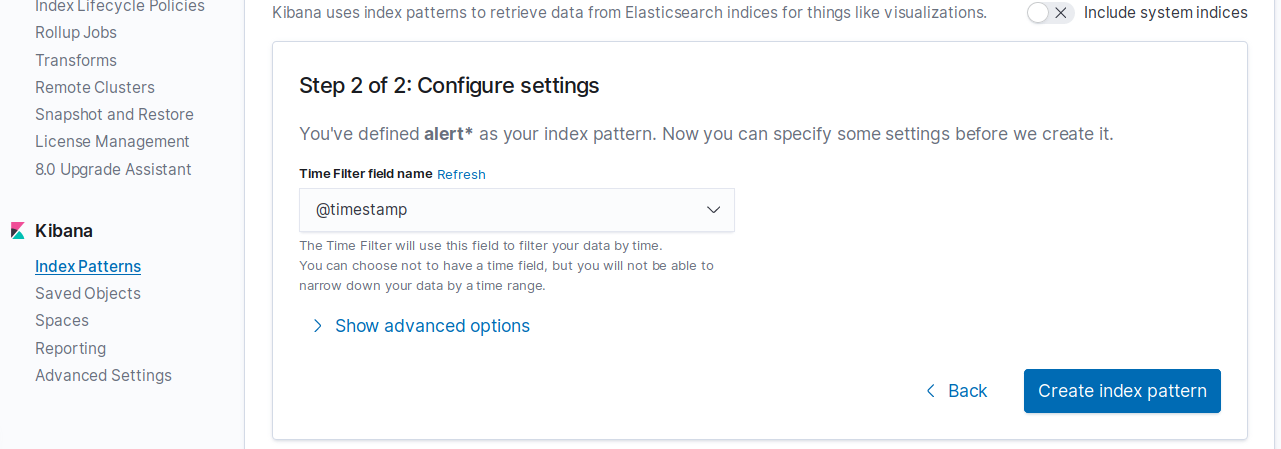Elasticsearch に入れたデータを元にアラートを送付する仕組みの一つに elastalert があります。
https://elastalert.readthedocs.io/en/latest/index.html
Elasticsearch 公式ではないですが、広く使われているようなので試しに使ってみます。
また、今回は kibana plugin 経由で実行してます。
マシンスペック等
OS: VirtualBox 上 Ubuntu 18.04
メモリ: 8196 MB
CPUコア数: 2
Elasticsearch と kibana の version: 7.6.2
テスト環境セットアップ
ローカル環境で実行するため、手軽に Docker を使って環境をセットアップしていきます。
ディレクトリ構造
├── docker-compose.yml
├── elastalert
│ ├── bin
│ │ ├── elastalert-start.sh
│ │ └── elastic_search_status.sh
│ ├── config
│ │ ├── config.json
│ │ ├── elastalert-test.yaml
│ │ └── elastalert.yaml
│ ├── Dockerfile
│ ├── pass
│ │ └── smtp_auth_user.yaml
│ ├── rules
│ └── rule_templates
├── elasticsearch
│ ├── config
│ │ └── elasticsearch.yml
│ └── Dockerfile
├── kibana
│ ├── config
│ │ └── kibana.xml
│ ├── Dockerfile
│ └── plugin
│ └── elastalert-kibana-plugin-1.1.0-7.6.2.zip
elasticsearch
FROM docker.elastic.co/elasticsearch/elasticsearch:7.6.2
cluster.name: "docker-cluster"
node.name: "node1"
node.master: true
node.data: true
network.host: 0.0.0.0
network.publish_host: _local_
discovery.seed_hosts: ["172.40.0.2"]
cluster.initial_master_nodes: ["node1"]
kibana
FROM docker.elastic.co/kibana/kibana:7.6.2
kibana.xml 内で elastalert-kibana-plugin を使用する旨を宣言します。
server.name: kibana
server.host: "0"
elasticsearch.hosts: [ "http://doc-elastic101:9200" ]
xpack.monitoring.ui.container.elasticsearch.enabled: true
elasticsearch.requestTimeout: 60000
# elastalert-kibana-plugin
elastalert-kibana-plugin.serverHost: elastalert
elastalert-kibana-plugin.serverPort: 3030
plugin/elastalert-kibana-plugin-1.1.0-7.6.2.zip については前バージョンを元に作成します。
# Download necessary files
cd /tmp
curl -L -O https://github.com/bitsensor/elastalert-kibana-plugin/releases/download/1.1.0/elastalert-kibana-plugin-1.1.0-7.5.0.zip
curl -L -O https://raw.githubusercontent.com/mmguero-dev/Malcolm/development/kibana/elastalert-kibana-plugin/server/routes/elastalert.js
# update elasticsearch package to 7.6.2
mv elastalert.js elastalert-server-routes.js
mv elastalert-kibana-plugin-1.1.0-7.5.0.zip elastalert-kibana-plugin-1.1.0-7.6.2.zip
unzip elastalert-kibana-plugin-1.1.0-7.6.2.zip kibana/elastalert-kibana-plugin/package.json
sed -i "s/7\.5\.0/7\.6\.2/g" kibana/elastalert-kibana-plugin/package.json
mkdir -p kibana/elastalert-kibana-plugin/server/routes/
mv /tmp/elastalert-server-routes.js kibana/elastalert-kibana-plugin/server/routes/elastalert.js
zip elastalert-kibana-plugin-1.1.0-7.6.2.zip kibana/elastalert-kibana-plugin/package.json kibana/elastalert-kibana-plugin/server/routes/elastalert.js
# delete remaining directory
rm -rf kibana
# copy the created package to your workspace
cp /tmp/elastalert-kibana-plugin-1.1.0-7.6.2.zip {your_workspace}/kibana/plugin
elastalert
FROM bitsensor/elastalert:3.0.0-beta.1
USER root
RUN apk update && \
apk add bash curl && \
rm -rf /var/cache/apk/*
ADD elastalert/bin/elastalert-start.sh /usr/local/bin/
ADD elastalert/bin/elastic_search_status.sh /usr/local/bin/
RUN chmod +x /usr/local/bin/elastalert-start.sh
USER node
ENTRYPOINT ["/usr/local/bin/elastalert-start.sh"]
# !/bin/bash
set -e
echo "Giving Elasticsearch at $ELASTICSEARCH_URL time to start..."
elastic_search_status.sh
echo "Starting ElastAlert!"
npm start
# !/bin/bash
set -e
if [ $# -gt 0 ]; then
ES_URL="$1"
elif [[ -n $ELASTICSEARCH_URL ]]; then
ES_URL="$ELASTICSEARCH_URL"
elif [[ -n $ES_HOST ]] && [[ -n $ES_PORT ]]; then
ES_URL="http://$ES_HOST:$ES_PORT"
else
ES_URL="http://doc-elastic101:9200"
fi
until [[ "$(curl -fsSL "$ES_URL/_cat/health?h=status" | sed -r 's/^[[:space:]]+|[[:space:]]+$//g')" =~ ^(yellow|green)$ ]]; do
# printf '+' >&2
sleep 1
done
echo "Elasticsearch is up and healthy at "$ES_URL"" >&2
{
"appName": "elastalert-server",
"port": 3030,
"wsport": 3333,
"elastalertPath": "/opt/elastalert",
"verbose": true,
"es_debug": false,
"debug": false,
"rulesPath": {
"relative": true,
"path": "/rules"
},
"templatesPath": {
"relative": true,
"path": "/rule_templates"
},
"es_host": "elasticsearch",
"es_port": 9200,
"writeback_index": "elastalert_status"
}
# NOTE: This config is used when testing a rule
# The elasticsearch hostname for metadata writeback
# Note that every rule can have its own elasticsearch host
es_host: doc-elastic101
# The elasticsearch port
es_port: 9200
# This is the folder that contains the rule yaml files
# Any .yaml file will be loaded as a rule
rules_folder: rules
# How often ElastAlert will query elasticsearch
# The unit can be anything from weeks to seconds
run_every:
seconds: 5
# ElastAlert will buffer results from the most recent
# period of time, in case some log sources are not in real time
buffer_time:
minutes: 1
# Optional URL prefix for elasticsearch
# es_url_prefix: elasticsearch
# Connect with TLS to elasticsearch
# use_ssl: True
# Verify TLS certificates
# verify_certs: True
# GET request with body is the default option for Elasticsearch.
# If it fails for some reason, you can pass 'GET', 'POST' or 'source'.
# See http://elasticsearch-py.readthedocs.io/en/master/connection.html?highlight=send_get_body_as#transport
# for details
# es_send_get_body_as: GET
# Option basic-auth username and password for elasticsearch
# es_username: someusername
# es_password: somepassword
# The index on es_host which is used for metadata storage
# This can be a unmapped index, but it is recommended that you run
# elastalert-create-index to set a mapping
writeback_index: elastalert_status
# If an alert fails for some reason, ElastAlert will retry
# sending the alert until this time period has elapsed
alert_time_limit:
days: 2
# The elasticsearch hostname for metadata writeback
# Note that every rule can have its own elasticsearch host
es_host: doc-elastic101
# The elasticsearch port
es_port: 9200
# This is the folder that contains the rule yaml files
# Any .yaml file will be loaded as a rule
rules_folder: rules
# How often ElastAlert will query elasticsearch
# The unit can be anything from weeks to seconds
run_every:
seconds: 5
# ElastAlert will buffer results from the most recent
# period of time, in case some log sources are not in real time
buffer_time:
minutes: 1
# Optional URL prefix for elasticsearch
# es_url_prefix: elasticsearch
# Connect with TLS to elasticsearch
# use_ssl: True
# Verify TLS certificates
# verify_certs: True
# GET request with body is the default option for Elasticsearch.
# If it fails for some reason, you can pass 'GET', 'POST' or 'source'.
# See http://elasticsearch-py.readthedocs.io/en/master/connection.html?highlight=send_get_body_as#transport
# for details
# es_send_get_body_as: GET
# Option basic-auth username and password for elasticsearch
# es_username: someusername
# es_password: somepassword
# The index on es_host which is used for metadata storage
# This can be a unmapped index, but it is recommended that you run
# elastalert-create-index to set a mapping
writeback_index: elastalert_status
# If an alert fails for some reason, ElastAlert will retry
# sending the alert until this time period has elapsed
alert_time_limit:
days: 2
後で出てきますが、今回は gmail にメールを送付したいため、認証用のユーザとパスワードが書いたファイルを用意しておきます。
user: "xxxx@gmail.com"
password: "xxxx"
version: '3.2'
services:
elasticsearch:
build:
context: elasticsearch/
hostname: doc-elastic101
container_name: elastic1
ports:
- "9200:9200/tcp"
- "9300:9300/tcp"
networks:
elk_nw:
ipv4_address: 172.60.0.2
volumes:
- type: bind
source: ./elasticsearch/config/elasticsearch.yml
target: /usr/share/elasticsearch/config/elasticsearch.yml
read_only: true
- type: volume
source: elasticsearch-data
target: /usr/share/elasticsearch/data
extra_hosts:
- "doc-kibana101:172.60.0.4"
kibana:
build:
context: kibana/
hostname: doc-kibana101
container_name: kibana1
command: sh -c './bin/kibana-plugin list | grep elastalert-kibana-plugin@1.1.0; result=`echo $$?`; if [ $$result = 1 ]; then ./bin/kibana-plugin install file:///usr/share/kibana/work/elastalert-kibana-plugin-1.1.0-7.6.2.zip && exec /usr/local/bin/kibana-docker; else exec /usr/local/bin/kibana-docker; fi'
ports:
- "5601:5601/tcp"
networks:
elk_nw:
ipv4_address: 172.60.0.4
volumes:
- type: bind
source: ./kibana/config/kibana.xml
target: /usr/share/kibana/config/kibana.yml
read_only: true
- type: bind
source: ./kibana/plugin
target: /usr/share/kibana/work
read_only: true
extra_hosts:
- "doc-elastic101:172.60.0.2"
depends_on:
- elasticsearch
elastalert:
container_name: elastalert
build:
context: .
dockerfile: elastalert/Dockerfile
image: elastalert:0.2.1
ports:
- 3030:3030
- 3333:3333
depends_on:
- elasticsearch
- kibana
networks:
elk_nw:
ipv4_address: 172.60.0.5
volumes:
- ./elastalert/config/elastalert.yaml:/opt/elastalert/config.yaml
- ./elastalert/config/elastalert-test.yaml:/opt/elastalert/config-test.yaml
- ./elastalert/config/config.json:/opt/elastalert-server/config/config.json
- ./elastalert/rules:/opt/elastalert/rules
- ./elastalert/rule_templates:/opt/elastalert/rule_templates
- ./elastalert/pass:/opt/elastalert/pass
extra_hosts:
- "doc-elastic101:172.60.0.2"
- "doc-kibana101:172.60.0.4"
volumes:
elasticsearch-data:
driver: local
networks:
elk_nw:
driver: bridge
ipam:
driver: default
config:
- subnet: 172.60.0.0/16
実行
以下のコマンドで
- 元になる DockerImage のダウンロード
- DockerImage の生成
- 各コンテナの起動
まで行ってくれます。
※自分の環境下ではダウンロードにもやや時間がかかりましたが、コンテナの起動後、全てのサービスが起動状態になるまで15分ほど要しました。
$ docker-compose up --build -d
とりあえず、以下のように3つのコンテナが起動している状態になるまで待ちます。
$ docker ps
CONTAINER ID IMAGE COMMAND CREATED STATUS PORTS NAMES
9b38f592fd57 elastalert:0.2.1 "/usr/local/bin/elas…" x days ago Up 3 minutes 0.0.0.0:3030->3030/tcp, 0.0.0.0:3333->3333/tcp elastalert
696929e31b45 dockerelk_kibana "/usr/local/bin/dumb…" x days ago Up 3 minutes 0.0.0.0:5601->5601/tcp kibana1
a06d24afc2d3 dockerelk_elasticsearch "/usr/local/bin/dock…" x days ago Up 3 minutes 0.0.0.0:9200->9200/tcp, 0.0.0.0:9300->9300/tcp elastic1
kibana UI
http://localhost:5601 にアクセスします。
正しくプラグインがインストールされていれば、次のようなアイコンが生成されているはずです。

ルールの作成
Create Rule ボタンからルールを作成していきます。
構文については、以下を参照。
https://elastalert.readthedocs.io/en/latest/ruletypes.html
例)
Rule name: test
es_host: doc-elastic101
es_port: 9200
name: First rule
type: frequency
index: alert*
is_enabled: true
num_events: 1
timeframe:
hours: 10
filter: []
# subject to email
alert_subject: "Search Spike"
alert:
- "email"
email:
- "xxxx@gmail.com"
smtp_host: "smtp.gmail.com"
smtp_port: 465
smtp_ssl: true
from_addr: "xxxx@gmail.com"
smtp_auth_file: "/opt/elastalert/pass/smtp_auth_user.yaml"
- filter: [] とすることで、(アラートを送信する条件を設けず) elasticsearch にメッセージが届いただけでアラートを飛ばすようにしています。
- 送信元と送信先のメールアドレスは同じでOK
テスト
gmail 安全性の低いアプリのアクセスを許可する
以下にアクセスして、安全性の低いアプリの許可: 有効 にしておきます。
https://myaccount.google.com/lesssecureapps
テストデータの作成: Index patter の生成用
kibana UI から以下のクエリを投げます。
@timestamp は適当な直近の時刻をしていします。
PUT /alert/_doc/1
{
"title": "Test Alart1",
"name": {
"first": "test",
"last": "taro"
},
"@timestamp": "2020-MM-ddThh:mm:ss+0900"
}
Index pattern の生成
kibana UI から Index pattern を生成します。
Index pattern名は "alert*" とします。

テストデータの作成: アラート送信用
kibana UI から以下のクエリを投げます。
@timestamp は現在時刻から直後の時刻(1分後など)を指定します
PUT /alert/_doc/2
{
"title": "Test Alart2",
"name": {
"first": "test",
"last": "taro"
},
"@timestamp": "2020-MM-ddThh:mm:ss+0900"
}
指定したメールアドレスに以下のようなメッセージが到着していれば成功です。
First rule
At least 1 events occurred between 2020-MM-dd hh:mm UTC and 2020-MM-dd hh:mm UTC
@timestamp: 2020-MM-dd hh:mm:ss+09:00
_id: 2
_index: alert
_type: _doc
name: {
"first": "test",
"last": "taro"
}
num_hits: 1
num_matches: 1
title: Test Alart2
ハマった箇所
-
安全性の低いアプリの許可: 無効 だとメール送信できない
セキュアな設定があると思われますが、未確認です -
ドキュメント内に @timestamp のフィールドが含まれていないと動かない
ProcessController: ERROR:root:Error running query: RequestError(400, u'search_phase_execution_exception', u'No mapping found for [@timestamp] in order to sort on')
ドキュメントの到着時刻を elastalert が判断するために必要 -
elastalert config で "debug": true だとアラート送信しない
デバッグモードだと検知してもアラート送信しませんでした(公式ドキュメントでは未確認) -
ElastAlert Kibana Plugin の UI から Edit rule を選択すると編集モードになる
編集モード内に Test ボタンがあるが、実行してもアラートは送信されない
以下のようにルールに match するメッセージが何件あったか表示される
Successfully loaded First rule
Would have written the following documents to writeback index (default is elastalert_status):
silence - {'rule_name': 'First rule', '@timestamp': ...}
elastalert_status - {'hits': 2, 'matches': 2, '@timestamp': ...}
-
docker logs elastalert -f でログが表示できるが、"verbose": true にしておかないと詳細なログが表示されず問題に気づけない。
-
AttributeError: 'Namespace' object has no attribute 'verbose'
Docker の version: 3.0.0-beta.0 では動作しなかった
-> 3.0.0-beta.1 に変更することで解消した
次の課題
- フィルター条件を具体的に指定してみる
- メールのコンテンツをカスタマイズしてみる
参考
Trouble shooting
Elastalert not alerting via emai
How to resolve 'Error connecting to SMTP host' in elastalert?
My elastalert is running normally, but I have not received any email alerts
Elastalert Test Rules doesn't send any alert
elastalert not sending out email
Email sending error in elastalert. SMTPSenderRefused: (530, '5.5.1 Authentication Required)
Matches found but 0 alerts sent
unable to connect smtp server with correct username and password
how to fix “send-mail: Authorization failed 534 5.7.14
Elasticsearchのデータを基にアラート通知する方法の調査
bitsensor/elastalert
elastalertでアプリの異常を自動検知して通知したい
Praeco (ElastAlert GUI)でElasticsearchログアラートする
bitsensor/elastalert-kibana-plugin
Error executing elastalert-test-rule during args/conf readout
Tips
ElastAlert for first time and Configuration
Integrating ElastAlert Email Alerting with Elasticsearch
ElastAlert Documentation
ElastAlert —Configurations & Frequency Rule Type to Email
Rule Types and Configuration Options
